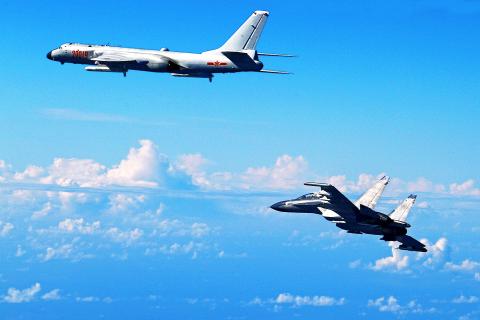Chinese military aircraft yesterday flew over the East China Sea to the south of Japan’s Okinawa Island and circled the international airspace surrounding Taiwan before passing over the Bashi Channel to return to China, officials from the Ministry of National Defense said.
It was the second time in two weeks that Chinese military aircraft have flown around Taiwan and passed over the Miyako Strait between Japan’s Okinawa and Miyako islands.
Yesterday’s flight launched at about 9am from the People’s Liberation Army (PLA) Air Force’s Eastern Theater Command bases and involved a dozen aircraft, the ministry said in a statement, adding that only four aircraft traveled the entire flight path around Taiwan.

Photo: (Shao Jing/Xinhua via AP)
Ministry officials did not provide any details on the type of aircraft that participated in the flight.
Two Xian H-6K bombers, a Tupolev Tu-154 surveillance aircraft and a Shaanxi Y-8 tactical transport aircraft participated in the previous flight on Nov. 25.
The aircraft taking part in yesterday’s flight were reportedly escorted by several Su-30 fighter jets coming in from the north as they crossed the Miyako Strait as per the PLA Air Force’s procedure for flying past the first island chain, before the main group turned south into international airspace.
They were similarly escorted after reaching airspace south of Taiwan as they flew over the Bashi Channel between Taiwan and the Philippines, before ending the mission and returning to their bases at 1:10pm, according to military sources.
The ministry said that the aircraft flew clockwise around Taiwan, whereas they flew counter-clockwise on Nov. 25.
"Our military forces monitored the PLA aircraft and had them under surveillance the entire time. There is no need to be concerned about the situation,” the statement read.
“After the PLA aircraft headed from the Chinese coast toward the East China Sea, Taiwan’s military radar stations locked onto them and tracked the entire flight,” said a senior military officer who declined to be named.
“The air force dispatched a reconnaissance patrol aircraft for surveillance and it took photographs of the Chinese aircraft and transmitted the images to a command station,” he said.
The ministry released the statement immediately after the incident. Following the Nov. 25 flight, the ministry’s delayed response drew criticism from the public and lawmakers, and raised concern that it had sought to cover up the incident.
Media reports said that neither flight infringed upon Taiwan’s or Japan’s territorial airspace, but this could not be independently verified.
Senior Chinese military officials in September announced that they will conduct “regular exercises” for flying past the first island chain, as China seeks to assert its presence in disputed islands and marine territories in the South and East China seas.
Taiwan has virtually identical claims in the South China Sea.

A car bomb killed a senior Russian general in southern Moscow yesterday morning, the latest high-profile army figure to be blown up in a blast that came just hours after Russian and Ukrainian delegates held separate talks in Miami on a plan to end the war. Kyiv has not commented on the incident, but Russian investigators said they were probing whether the blast was “linked” to “Ukrainian special forces.” The attack was similar to other assassinations of generals and pro-war figures that have either been claimed, or are widely believed to have been orchestrated, by Ukraine. Russian Lieutenant General Fanil Sarvarov, 56, head

A magnitude 7.0 earthquake struck off Yilan at 11:05pm yesterday, the Central Weather Administration (CWA) said. The epicenter was located at sea, about 32.3km east of Yilan County Hall, at a depth of 72.8km, CWA data showed There were no immediate reports of damage. The intensity of the quake, which gauges the actual effect of a seismic event, measured 4 in Yilan County area on Taiwan’s seven-tier intensity scale, the data showed. It measured 4 in other parts of eastern, northern and central Taiwan as well as Tainan, and 3 in Kaohsiung and Pingtung County, and 2 in Lienchiang and Penghu counties and 1

SAFETY FIRST: Double the number of police were deployed at the Taipei Marathon, while other cities released plans to bolster public event safety Authorities across Taiwan have stepped up security measures ahead of Christmas and New Year events, following a knife and smoke bomb attack in Taipei on Friday that left four people dead and 11 injured. In a bid to prevent potential copycat incidents, police deployments have been expanded for large gatherings, transport hubs, and other crowded public spaces, according to official statements from police and city authorities. Taipei Mayor Chiang Wan-an (蔣萬安) said the city has “comprehensively raised security readiness” in crowded areas, increased police deployments with armed officers, and intensified patrols during weekends and nighttime hours. For large-scale events, security checkpoints and explosives

‘POLITICAL GAME’: DPP lawmakers said the motion would not meet the legislative threshold needed, and accused the KMT and the TPP of trivializing the Constitution The Legislative Yuan yesterday approved a motion to initiate impeachment proceedings against President William Lai (賴清德), saying he had undermined Taiwan’s constitutional order and democracy. The motion was approved 61-50 by lawmakers from the main opposition Chinese Nationalist Party (KMT) and the smaller Taiwan People’s Party (TPP), who together hold a legislative majority. Under the motion, a roll call vote for impeachment would be held on May 19 next year, after various hearings are held and Lai is given the chance to defend himself. The move came after Lai on Monday last week did not promulgate an amendment passed by the legislature that